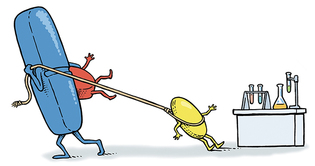 loading
loading
FindingsWhen big drug companies buy little drug companiesIt's called a "killer acquisition." And it's not good for patients.  Gregory NemecView full imageLarge companies often have a taste for smaller firms—for their talent, or their product lines, or their potential to help the larger firm expand. But when one company gobbles up another for the purpose of terminating the smaller firm’s projects and destroying its potential as a competitor, we are looking, says Florian Ederer, at a “killer acquisition.” It’s a regular practice in the pharmaceutical industry. Ederer is an associate professor of economics at the Yale School of Management. With SOM finance professor Song Ma and London Business School’s Colleen Cunningham, he reviewed acquisitions in the industry to see how often they eliminated potential competitors. The researchers examined data on more than 35,000 drug research projects for the US market from 1989 to 2011. They found that about six percent of the transactions fit the description of a killer acquisition: an established pharmaceutical company acquires a smaller, innovative firm for the sole purpose of terminating its research in order to preempt future competition. The larger firm could, of course, continue the research itself, but that would mean adding new expenses. Meanwhile, for the target company, an acquisition delivers solid financial gain, rarely guaranteed while a drug is still in development. Though the companies might gain, patients, hospitals, and clinicians do not. Six percent of the pharmaceutical industry’s acquisitions may not sound like much. But it translates into as many as 13 fewer new drugs per year that will never reach the consumer market. Moreover, killer acquisitions reduce competition, resulting in higher prices for existing drugs. And some of the drugs that aren’t developed might have been beneficial, generating fewer side effects or better performance for some patients. Although the US has a robust system of antitrust regulations, they kick in only above a certain sales or assets threshold that these cases usually don’t reach. “Our results,” says Ederer, “suggest that antitrust policy should continue to closely scrutinize the impact of acquisitions on innovation”—especially when there’s a risk of losing promising new products.
The comment period has expired.
|
|